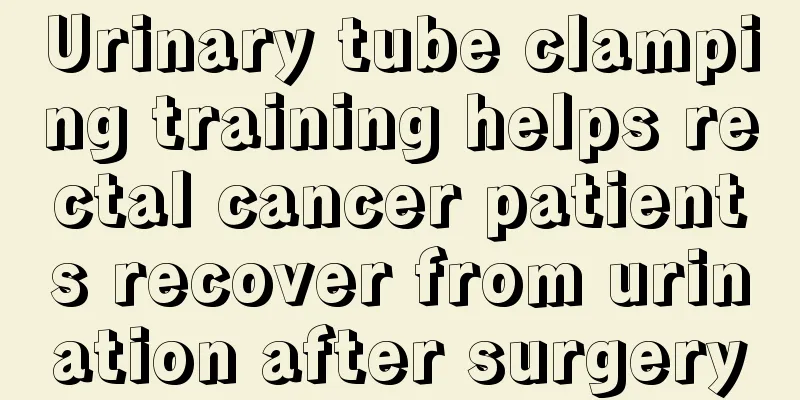Hemorrhoids with hard cores are actually prolapsed hemorrhoids

|
Hemorrhoids are also known as hemorrhoids. There are many types of hemorrhoids. Generally speaking, there are one or more venous clusters near the anus. This is a chronic disease. Hemorrhoids trouble many people in life. People say that hemorrhoids have hard cores, but that is actually prolapsed hemorrhoids. There are many causes of hemorrhoids. Here is a brief overview of the causes of hemorrhoids, the symptoms of hemorrhoid patients, and the main treatment methods. 1. Causes of hemorrhoids 1. Abnormal bowel movements: Diarrhea and constipation are both important causes of hemorrhoids. Constipation is the biggest cause of trouble. Long-term retention of toxic substances in the rectum can not only cause rectal cancer, but also cause feces accumulation and affect blood circulation. 2. Bad bowel habits: squatting to read books or newspapers while going to the toilet, which causes prolonged squatting and bowel movement time, easily causing blood stasis in the anus and rectum and leading to disease. Some people exert too much force during defecation, regardless of whether the feeling of defecation is strong or not, and blindly and continuously exert force. This will only increase unnecessary burden and cause local congestion in the rectum, anus and pelvic floor muscles, leading to the occurrence and spread of diseases. 3. Chronic diseases: such as long-term malnutrition and weak constitution, which lead to relaxation and weakness of the anal sphincter. Long-term suffering from chronic bronchitis and emphysema, with cough and asthma causing increased abdominal pressure and pelvic congestion. Chronic hepatitis, cirrhosis, diarrhea, colitis, etc. are all causes of anorectal diseases. 4. Dietary reasons: the coarseness of food quality, changes in vegetable types and increases or decreases in quantity, the content of protein, fat, starch, cellulose, etc., and water intake can all directly affect the composition of stool and lead to anorectal diseases. 5. Physiological reasons: The colon and cecum are the main organs for transporting food residues and storing feces. After food is decomposed and absorbed by the body, the residues often contain a large amount of harmful substances. If they remain in the colon and cecum for a long time, they can cause tumors. 6. Anatomical reasons: The anal venous system and vena cava system are located at the lower end of the rectum, with many venous plexuses and anastomotic branches. The venous walls are weak, with reduced resistance to pressure, and the submucosal tissue of the rectum is loose, which is conducive to venous enlargement, varicose veins, and deformation, making it easy to form hemorrhoids. 7. Genetic reasons. 8. Causes of abnormal embryonic development: Abnormal development process may cause many congenital anorectal diseases in the anorectal area, such as congenital imperforate anus, congenital rectovaginal fistula, congenital megacolon, etc. 2. Symptoms of hemorrhoids 1. Blood in stool: It is characterized by mild pain, intermittent bleeding after defecation, and bright red blood. It is also a common symptom of internal hemorrhoids or mixed hemorrhoids in the early stage. Patients often complain that "blood drips down from the anus after defecation" or "there is blood on the toilet paper." 2. Prolapse of hemorrhoids: This is often a late symptom, with blood in the stool occurring first, followed by prolapse. As the size of the hemorrhoids increases, they are squeezed by feces during defecation, gradually separating from the muscle layer and protruding out of the anus. Initially, it only comes out during defecation and then returns to its original position after defecation. For those with more severe symptoms, the prolapse must be pushed back by hand or rest in bed before it can be restored. For those with more severe symptoms, in addition to prolapse during defecation, it may also occur with any exertion, walking, coughing, sneezing, squatting, etc. 3. Pain: Simple internal hemorrhoids are generally painless, and sometimes only cause a feeling of heaviness in the anus or difficulty in defecation. If the hemorrhoids are inflamed and swollen, there may be thrombosis or incarceration inside, which will cause pain; if they are prolapsed and not repositioned in time, the pain will worsen; if incarceration occurs, there will be ulceration and necrosis, causing inflammation and edema of the skin around the anus, the pain will be severe and the patient will be restless. 4. Mucus outflow: The rectal mucosa is stimulated by hemorrhoids for a long time, causing increased secretions. In the late stage of internal hemorrhoids, secretions often flow out of the anus due to relaxation of the anal sphincter. In mild cases, it will flow out during bowel movements, and in severe cases, it will flow out naturally even without bowel movements. When internal hemorrhoids prolapse, there will be more discharge. 5. Itching: Due to the stimulation of secretions or prolapsed hemorrhoids, the skin around the anus is moist all day long, leading to eczema and itching. 3. Treatment of hemorrhoids 1. Symptom Relief: This is a short-term symptom relief solution that will provide temporary relief from pain and inflammation. They will not result in hemorrhoid elimination. This may be an over the counter or by prescription medication. 2. Natural home remedies: These combine symptom-relieving herbal compounds designed to support and repair damaged hemorrhoidal tissue as well as address digestive tract problems that inhibit hemorrhoidal tissue repair. In most cases, this method is the preferred method. 3. Surgical Treatment: For difficult cases that will not respond to home-based or conservative measures, there are many procedures designed to directly address hemorrhoids. Some are quick and simple, others are more complicated and require hospitalization. These methods should be used as a last resort. |
<<: What are the symptoms of Pakinson's disease
>>: Effects and functions of costus root
Recommend
Common symptoms of colon cancer that everyone needs to pay attention to
In real life, many people are familiar with the d...
Can moxibustion cure advanced tongue cancer?
When tongue cancer develops to the late stage, pa...
Is rectal cancer easy to cure?
Rectal cancer is a common malignant tumor in the ...
How can liver cancer turn negative in 15 days? Is liver cancer contagious?
In the late stage of liver cancer, you should avo...
One side of the ear is blocked
Many nerves inside the ear are closely related to...
What are the health care measures for patients with ovarian tumors
It is one of the three major malignant tumors of ...
Can rhinitis caused by lung cancer be cured?
Can rhinitis caused by lung cancer be cured? Rhin...
What are the symptoms of hemangioma and what are the types of hemangioma
If unexplained red patches appear on infants or c...
The efficacy and function of salty mint
Mint is a common plant around us, especially in s...
The hazards of electric heating knee pads
Many people have discomfort in their joints, so w...
Quickly remove acne and see results in ten minutes
Acne is a skin disease that can be caused by vari...
How to choose diet after sigmoid rectal cancer surgery
For many patients with rectal cancer, in order to...
What are the side effects of ultraviolet light therapy
Many people are not aware of ultraviolet light th...
How to effectively treat snoring? It turns out there are these 7 ways
Snoring is a condition that many people experienc...
It is necessary for people to pay attention to the causes of prostate cancer
Prostate cancer is the most common malignant tumo...









